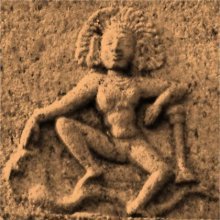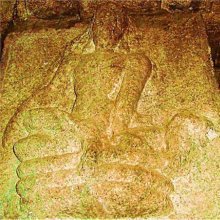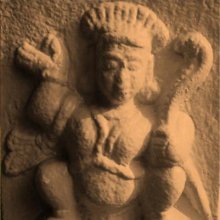Naganatha, Nāganātha, Naga-natha: 8 definitions
Introduction:
Naganatha means something in Hinduism, Sanskrit, Marathi. If you want to know the exact meaning, history, etymology or English translation of this term then check out the descriptions on this page. Add your comment or reference to a book if you want to contribute to this summary article.
Naganatha has 6 English definitions available.
Images (photo gallery)
Languages of India and abroad
Sanskrit dictionary
[Deutsch Wörterbuch]
Source: Cologne Digital Sanskrit Dictionaries: Böhtlingk and Roth Grosses Petersburger WörterbuchNāganātha (नागनाथ):—(1. nāga + nātha) m.
1) König der Schlangen Inschr. in [Journ. of the Am. Or. S. 7, 6,] [Śloka 16.] —
2) Nomen proprium zweier Männer [Weber’s Verzeichniss No. 833.] —
3) nāganātha n. und nāganātheśaliṅga n. Name eines der dem Śiva geweihten Liṅga [WOLLH. Myth. 80. 81.] [Weber’s Verzeichniss No. 1242.]
Source: Cologne Digital Sanskrit Dictionaries: Sanskrit-Wörterbuch in kürzerer FassungNāganātha (नागनाथ):——
1) m. — a) Schlangenfürst. — b) Nomen proprium zweier Männer. —
2) n. Name eines Liṅga.
Sanskrit, also spelled संस्कृतम् (saṃskṛtam), is an ancient language of India commonly seen as the grandmother of the Indo-European language family (even English!). Closely allied with Prakrit and Pali, Sanskrit is more exhaustive in both grammar and terms and has the most extensive collection of literature in the world, greatly surpassing its sister-languages Greek and Latin.
See also (Relevant definitions)
Starts with: Naganathamahatmya, Nakanatam, Nakanatan.
Ends with: Avandyanaganatha, Nilakantha naganatha.
Full-text (+16): Nilakantha naganatha, Nidanapradipa, Khandaprashasta, Jnanadhiraja, Padamnayasiddhi, Purushottamacampu, Jnanaraja, Bara Jyotilingem, Nimbadeva, Viramaheshvaracarasamgraha, Parvaprabodha, Mudgala, Siddhantasundara, Vaidyanatha, Danaparijata, Nilakantha, Surya suri, Surya kavi, Madhavavidana, Surya pandita.
Relevant text
Search found 7 books and stories containing Naganatha, Nāganātha, Naga-natha, Nāga-nātha; (plurals include: Naganathas, Nāganāthas, nathas, nāthas). You can also click to the full overview containing English textual excerpts. Below are direct links for the most relevant articles:
Dvisahasri of Tembesvami (Summary and Study) (by Upadhyay Mihirkumar Sudhirbhai)
Chapter 20 - Description of the Devotion
Works of H. H. Ṭembesvāmī < [H. H. Ṭembesvāmī: Life, Date & Works]
Kuntaka’s evaluation of Sanskrit literature (by Nikitha. M)
2. The concept of vakrokti in earlier poeticians < [Chapter 1 - Vakroktijīvita: A Synoptic Survey]
3.3. The concept of figures (alaṅkāras) according to Kuntaka < [Chapter 1 - Vakroktijīvita: A Synoptic Survey]
Origin and development of Sanskrit poetics < [Introduction]
The Shiva Purana (by J. L. Shastri)
Chapter 22 - On the partaking of the Naivedya of Śiva and the greatness of Bilva < [Section 1 - Vidyeśvara-saṃhitā]
The backdrop of the Srikanthacarita and the Mankhakosa (by Dhrubajit Sarma)
Bhagavad-gita Mahatmya (by N.A. Deshpande)
The Skanda Purana (by G. V. Tagare)
Chapter 21 - The Origin of the River Kapilā < [Section 3 - Revā-khaṇḍa]




